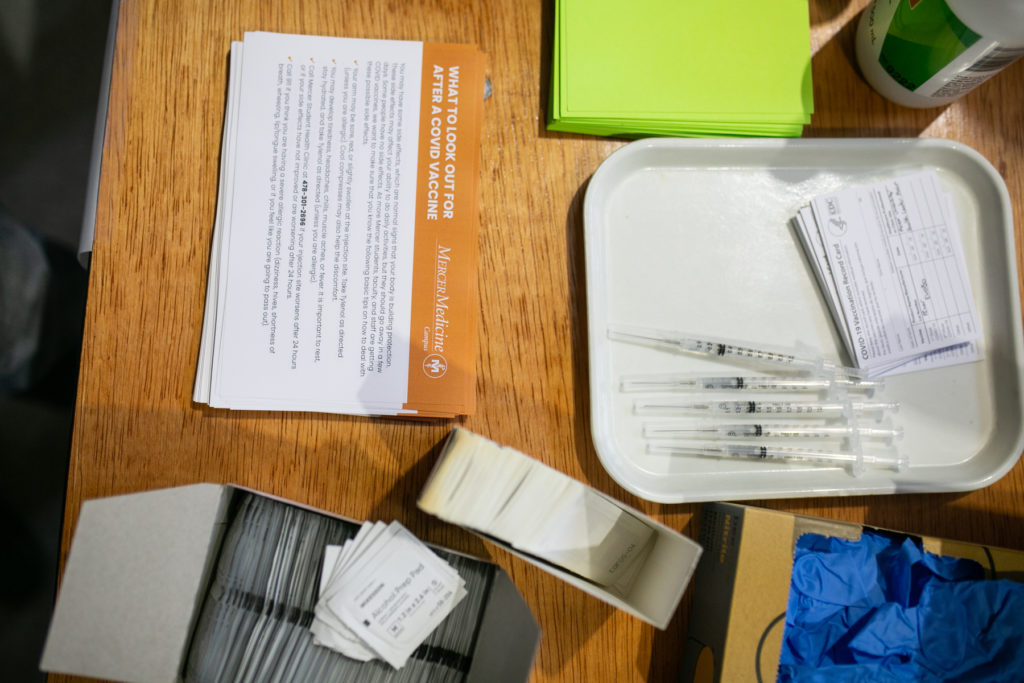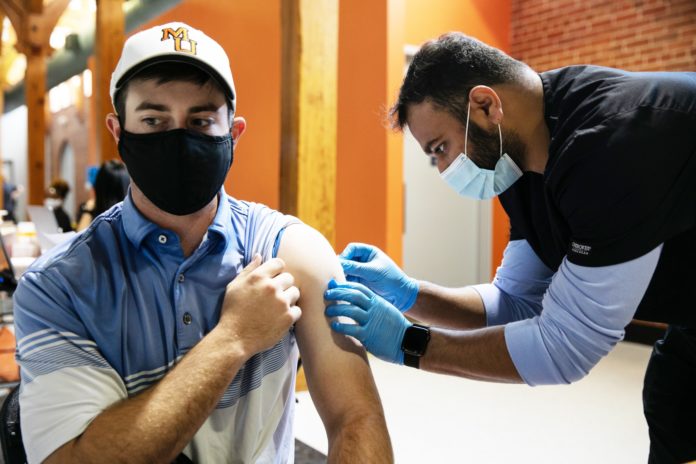Vaccines are one of the safest medicines a person can put into their body and are a key tool in preventing deaths from COVID-19, a Mercer University College of Pharmacy vaccine researcher says.
“I would say to anyone and everyone: Please go out and get vaccinated just for your own safety,” said Dr. Martin D’Souza, a professor of pharmaceutical sciences who focuses on the design and delivery of nanovaccines for infectious diseases and cancer.
Dr. D’Souza has decades of experience in vaccine research and development. Here, he responds to common concerns about the safety of the COVID-19 vaccine.
The Food and Drug Administration has given Emergency Use Authorization to three COVID-19 vaccines in the United States. While the following discussion generally focuses on the two messenger RNA, or mRNA, vaccines manufactured by Pfizer-BioNTech and Moderna, Dr. D’Souza also stressed the safety and effectiveness of the Johnson & Johnson shot, which functions more like a traditional vaccine.
1. The COVID-19 vaccine is new, and I’m worried about long-term effects. How do I know I won’t experience vaccine-related problems down the road?

The mRNA vaccines are specifically designed to stimulate the creation of antibodies against the SARS-CoV-2 virus, which can lead to COVID-19, Dr. D’Souza said. And once they’ve done their job, they stop.
“When you look at this mRNA vaccine, it’s impossible for it to do anything else,” he said. “It goes into the cell, gives a signal to multiply that same protein and create antibodies, and it makes ‘x’ number of copies, and then it automatically has a stop cycle within the sequence that will make it stop multiplying.”
Simply put, the mRNA has one job, and once it’s complete, it breaks down and leaves your body. Because of this, there is no possibility of a side effect from an mRNA vaccine appearing years down the road, Dr. D’Souza said.
Additionally, while these are the first mRNA vaccines to come to market, the technology is not new. It was not previously used in vaccines because it was costly, and traditional vaccines worked fine, so there was no need to create an mRNA vaccine until now, he said.
Takeaway: The mRNA technology used in COVID-19 vaccines has been around for a while, and because of the way mRNA works, there is not a risk of unknown long-term effects from these vaccines.
2. It took scientists significantly less time to develop the vaccine for COVID-19 compared to other diseases. I’m worried the process was rushed.
When it comes to making a typical vaccine, no one is in a hurry, Dr. D’Souza said.
“Let’s take the flu vaccine for example. Let’s say they’re coming up with the next generation, a new type of flu vaccine,” he said. “There are currently flu vaccines available, so no company is in a hurry to get it out tomorrow because the old one is still working.”
Enter the novel coronavirus, which caused COVID-19, upended lives and killed millions of people.
“The reason why this moved so fast is because we had nothing,” Dr. D’Souza said. “People were dying, and we really didn’t have a choice but to complete the trials as quickly as we could without compromising any of the studies.”
And with the need for a new vaccine came a desire to fund it.
In the U.S. alone, the government invested nearly $19 billion in vaccine research and development.
“The initial input for this kind of research was very expensive,” Dr. D’Souza said. “In fact, if most governments did not support the pharmaceutical companies, they would have had a very tough time getting all this done.”
Takeaway: Imminent need and robust funding helped shorten the timeframe for vaccine development without compromising clinical trials.
3. The vaccines only are authorized for emergency use. It makes me uncomfortable that they don’t have full FDA approval.
The clinical trials already were complete by the time the vaccines received Emergency Use Authorization, Dr. D’Souza said. The road to full approval is paved with paperwork.
“They have to put all the paper trail in place, and it’s really the paperwork that’s causing the delay,” he said. “And that takes forever, as you can imagine, a vaccine trial with so many multi-centers, people are just scattered in different parts of the country and around the world.
“All of that information now has to be tabulated. It has to be put into place, documented, and that’s when the final approval will come through.”
The initial submission to the FDA essentially stands, he said.
“Most of the data that was available at the emergency time is what’s being used for the full approval,” he said. “If there were any adverse effects, those have been added into the full approval process.”
The FDA is expected to give full authorization to the Pfizer vaccine by late summer or early fall.
Takeaway: Reviewing and filing documents is time consuming, but full authorization for at least one COVID-19 vaccine is expected soon.

4. Speaking of adverse effects, I’m scared of having one of the severe possible side effects that I’ve heard about and am not sure I want to take the risk.
The Centers for Disease Control and Prevention is tracking rare adverse events, but it’s important to remember that correlation does not equal causation.
Any adverse event that occurs during a certain period following vaccination is recorded, but that doesn’t mean the vaccine caused it. That event may have occurred regardless of whether the person had the vaccine, Dr. D’Souza said.
More than 4.71 billion doses of a COVID-19 vaccine have been administered worldwide. In April, the Los Angeles Times found that of the more than 150 million shots administered in the U.S., 0.005% may have resulted in a serious side effect.
“This is the only time in human history ever that so many millions, and billions, actually, of people have been vaccinated, all in a very narrow span,” Dr. D’Souza said. “When you look at these millions and billions of people that have gotten vaccinated in a very short span of literally six to eight months, it appears that there are adverse effects.
“But adverse effects are there for any medication. When you compare vaccines to any other medication, even the over-the-counter medications, the vaccine adverse effects are far less than anything we’ve encountered in our lifetime.”
Your chances of severe illness or death from the vaccine are far less than from COVID-19, which has killed more than 4.3 million people worldwide and can lead to long-term health issues.
Takeaway: Billions of people have received a COVID-19 vaccine with no serious side effects, and while the CDC is tracking rare adverse events, the possibility of severe illness or death is far greater from COVID-19 than from the vaccine.
5. I keep hearing about breakthrough cases in which vaccinated people are getting COVID-19. What’s the point of getting the vaccine if I can still catch the virus?
No vaccine offers 100% protection, so breakthrough cases are expected. But hospitalization and death reports show us that serious infections among vaccinated people are rare.
As a vaccinated person, “there’s no major risk,” Dr. D’Souza said. “I’m not going to die. … That’s the important thing. The mortality has gone down to like nothing.”
Even young, healthy people, whose chances of dying from COVID-19 are low, should get the vaccine, not only to help themselves but to also help others, Dr. D’Souza said.
“If they just think their chances of dying are very low, they may be right, and that’s fine, too,” he said. “The risky part is if they sneeze onto someone, an older person who is not vaccinated; they can really hurt that person.”
Takeaway: Breakthrough cases are expected but rare. Vaccines greatly reduce your chances of hospitalization and death from COVID-19 and help protect others.
Dr. D’Souza predicts that this novel coronavirus is here to stay, but with vaccination, it will become less deadly.
“Sadly, it’s here to stay with us,” he said. “That’s in the sense that just like we have the flu every year, this SARS-CoV-2 has basically come into the human cycle, and it’s not going anywhere anytime soon.”










